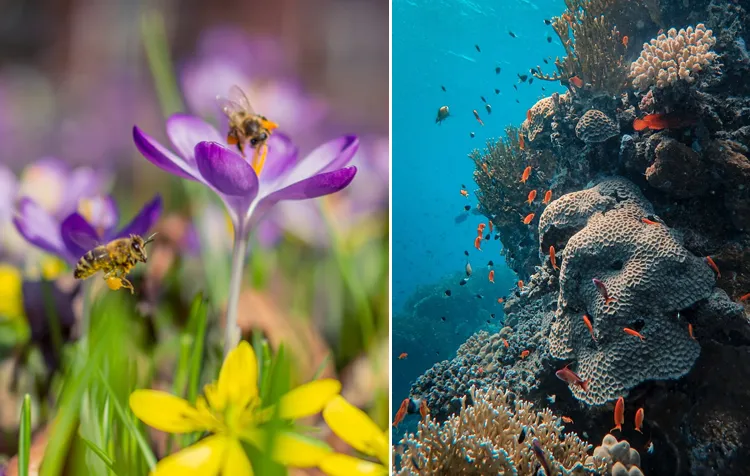What is actually meant by biodiversity? If you're looking for a clear answer to this question, you've come to the right place! Our Earth is home to an incredible diversity of life - from microorganisms to gigantic whales, from barren desert landscapes to dense rainforests. This biological diversity is what we call biodiversity.
But did you know that, according to the United Nations World Biodiversity Council, about one million of the world's eight million animal and plant species are at immediate risk of extinction?₁ Primarily because we humans are destroying natural areas and ecosystems in large numbers. In order to stop the global extinction of species, it is of great importance to understand the concept of biodiversity.
In this article I would like to give you everything you need to know about biodiversity. From the definition, levels, importance and dangers, to protective measures and effective everyday tips. Because biodiversity already starts in your own garden or on your balcony. Let's go!
Here you can find a short overview in advance:
Definition: What is biodiversity?
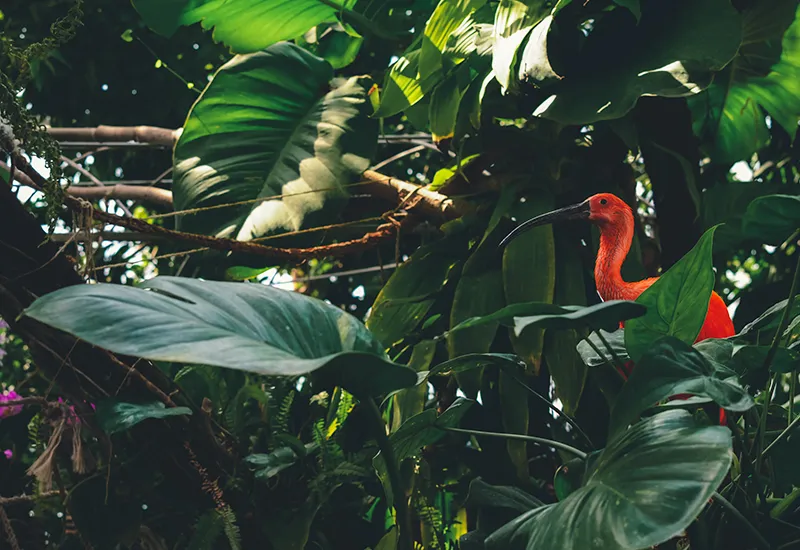
Biodiversity (also referred to as biological diversity) refers to the Diversity of all living species on the entire earth or within a specific region - including diversity within species, between species, and ecosystem diversity.
Good to know: There are around 14 million animal and plant species on our planet. But only about 1.7 million species have been scientifically identified and described so far. Most of them are insects.₂
Three levels: What does biodiversity entail?
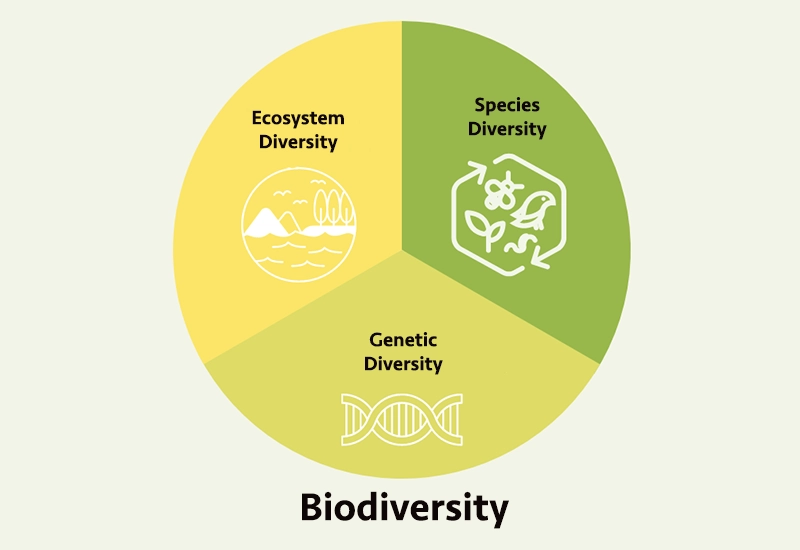
Biodiversity thus encompasses the totality of all living organisms. However, when we talk about biodiversity, we are talking about more than just the number of different species on our planet.
In fact, biodiversity consists of three interlocking levels: of genetic diversity, species diversity and ecosystem diversity. Each of these levels is critical to our planet and our own well-being.
Here I would like to introduce them to you briefly in more detail.
Genetic diversity
Genes are the basis for the inheritance of characteristics from one generation to the next. In this respect, genetic diversity is understood to mean the Diversity of genes within a species or all species of an ecosystem. The greater the genetic diversity species, the better it can adapt to changing environmental conditions and the more resistant it is to change.
The biodiversity
The level of biodiversity describes the Number and diversity of species in a particular ecosystem or around the world. Species are groups of organisms that differ from each other by certain characteristics such as morphology, reproduction and behavior. Higher species diversity ultimately also means that an ecosystem is more resilient to disturbances.
The diversity of ecosystems
The diversity of ecosystems is about the different habitats inhabited by existing species. Ecosystems are complex systems consisting of organisms, their delimited physical environment and their ecological interactions. These can be, for example, forests, oceans, mangroves, peatlands or grasslands.
The higher the diversity of ecosystems, the more different types of organisms will also find a habitat, which, among other things, provides them with many sources of food and a necessary protection from predators.
Significance: Why is biodiversity so important?
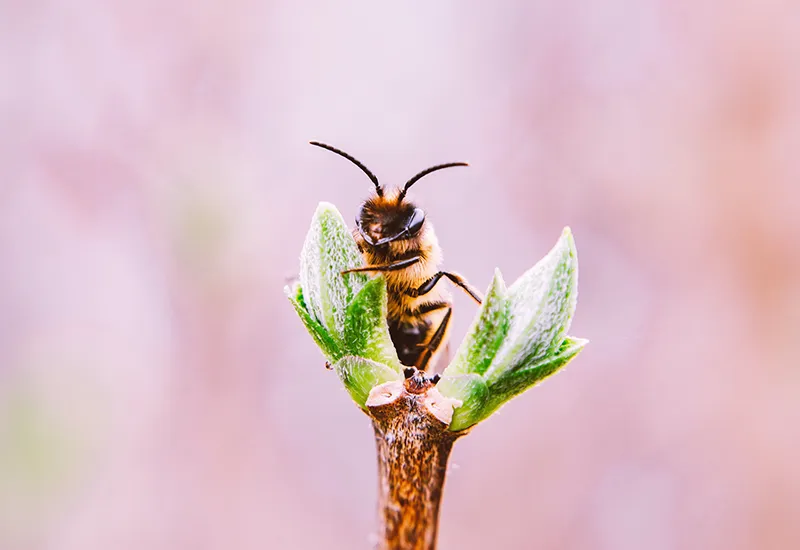
Basically every species has a right to exist and is valuable, even regardless of whether or not it provides a (direct) benefit to humans. But the ecosystem services that the totality of all living organisms perform for the environment alone also make them incredibly important for the lives of us humans.
Biodiversity is of fundamental importance to all life on Earth because most species, including us humans, depend on many other species for survival. We still do not know everything about the interconnections and relationships between the various animal and plant species. But we do know that they are numerous and that when one species becomes extinct, it has a negative impact on the ecosystem.
"If the bee disappeared off the surface of the globe, then man would have only four years of life left. No more bees, no more pollination, no more plants, no more animals, no more man."
Albert Einstein (more under Species protection quotes)
Biodiversity is also our ecological life insurance. Bees and some other insects, for example, provide the Plant pollinationthat we eat. Up to 85 percent of agricultural yields in plant and fruit cultivation in Germany depend on the pollination performance of the industrious helpers.₃
In addition, among many other ecosystem services, a high level of biodiversity provides, for example, for functioning ecosystems, clean air and drinkable water and for a natural pest control.
In addition, it provides us people valuable raw materials for consumption and production. Our economy and many livelihoods depend on them. Also their Importance for our mental well-being, for recreation, culture, education and for science is enormous.
Finally the Costs of biodiversity loss due to failure to take conservation measures much greaterthan the cost of protecting biodiversity.
Threats: What puts biodiversity at risk?
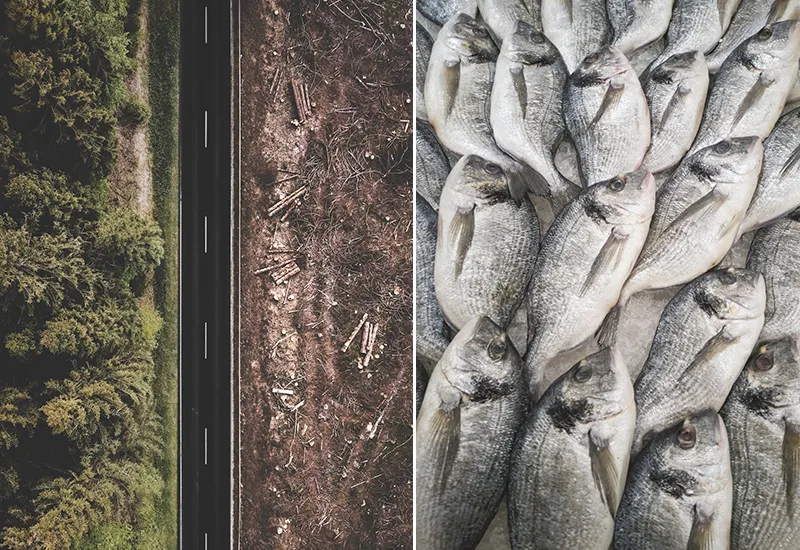
In order to protect biodiversity, it is imperative that we address what is threatening it in the first place. Well, the environmental problem of the Species extinction and mass extinction we humans - and nobody else - have to answer for.
I'll show you why that is and exactly how we are destroying biodiversity on Earth below:
- Habitat destruction and fragmentation: Urbanization, agriculture, and other human activities are destroying natural habitats or fragmenting them into smaller pieces.
- Climate change: Changing temperatures and precipitation patterns, as well as. increasing extreme weather as a result of man-made global warming, affect habitats and thereby naturally threaten the existence of many species.
- Overexploitation and overfishing: The intensive use and exploitation of nature, including fishing and hunting, can destabilize certain populations and lead to the collapse of entire ecosystems.
- Invasive species: Non-native species that have found their way into new regions or countries, whether intentionally or unintentionally, can displace native species and upset the natural balance in a sensitive ecosystem.
- Pollution: The Air pollution, water and soil destroys habitats and the existence of many species. Exhaust fumes, pollutant discharges and, above all, non-biodegradable plastic waste pose a major threat.
- Agricultural intensification: The use of chemical pesticides and fertilizers, as well as the economic preference for monocultures, has a significant impact on biodiversity.
- Illegal poaching and wildlife trafficking: Animal and environmental protection laws are often not respected. The illegal trade in animals threatens endangered species in particular. Last but not least, hunting tourism and trophy hunting of certain wild animals also pose a great danger.
Tips: What can each of us do in our everyday lives for more biodiversity?
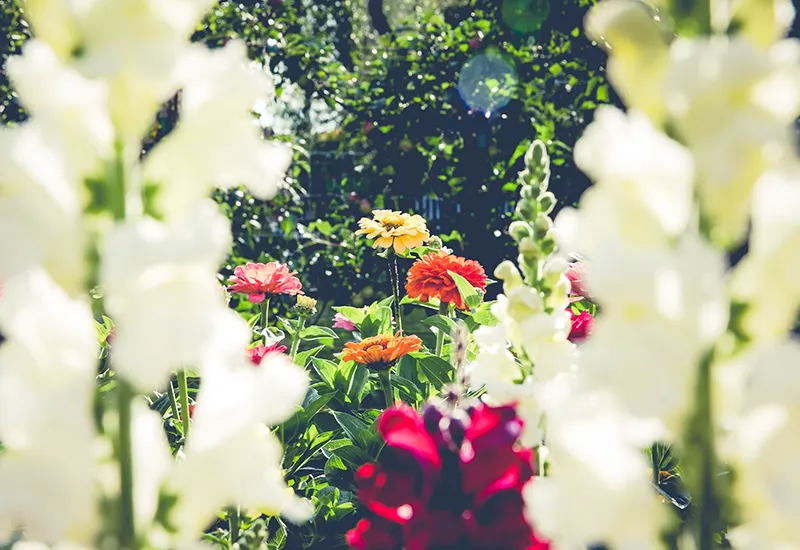
Organizations such as WWF or NABU are fighting - for example with Renaturation projects - daily for the preservation of biodiversity. And more and more companies are also getting involved and taking care of sustainable business practices and ensuring that Habitats important for biodiversity restored be
"And what can I do?" you may be asking yourself. Of course, you can support the environmental organizations professionally, voluntarily or financially in their commitment. But since biodiversity starts on a small scale, you can also do something outside of your work in organizations. already make a real difference in your own everyday life.
Here are some tips and suggestions for you:
- Refrain from the use of chemicals such as fertilizers, pesticides and insecticides in gardening. They harm us humans as well as wildlife and plants. Instead, opt for a natural pest control and fertilization.
- Plant your garden with native flowers, shrubs and trees. In this way, you promote the survival of local species. In addition, native plants are usually easier to care for because they have adapted to local conditions.
- Create an insect garden. Use plants that serve as food sources for bees, butterflies and other insects. You can even consider this when planting your balcony. You can find more tips in the article about the bee friendly garden.
- Live vegan: Whether it's beef, cheese, cow's milk, eggs or honey - there are now delicious plant-based alternatives for all animal products that make the switch easier. By going vegan and eating a plant-based diet, you automatically live in a more climate-friendly way and make a decisive contribution to the protection of biodiversity.
- Seal as few surfaces as possible. Gravel garden was yesterday. There are even municipalities that actively prohibit this type of surface sealing because it is detrimental to the urban climate. Even a courtyard driveway can be made load-bearing with low sealing.
Even more Tips to stop the extinction of speciesYou can find more information in a separate article.
Tip: The creation of low-maintenance gravel gardens is definitely one of the most biggest environmental sins of everyday life. I'll explain what else falls into this category in the linked blog post.
Protecting biodiversity means protecting people
All life on earth is related to each other and is in a constant balance. This balance must be maintained to ensure optimal living conditions. But it is fragile and more threatened than ever. We must not believe that we are above nature and can remain healthy as the only living being on an unhealthy planet.
Through the explicit protection and sustainable use of natural resources we can ensure that the planet's biodiversity is preserved for future generations.
Do you have any questions, suggestions or further tips for the preservation of biodiversity? Then I look forward to your comment.
Stay environmentally friendly,

PS: Biodiversity is one of many Technical terms around the topic of sustainability. Next, in the linked blog article, I'll be happy to introduce you to many more definitions. But you might also be interested in how you can Stop insect mortality in everyday life can. Either way, I hope you enjoy reading!
References:
₁ ZEIT ONLINE: One million species are threatened with extinction (as of May 06, 2019), available at https://www.zeit.de/wissen/umwelt/2019-05/artenvielfalt-kernaussagen-welt-bericht-paris-weltbiodiversitaetsrat-artensterben. [30.05.2023].
₂ INITIATIVE Diversity 2030: Biodiversity - It enriches our life on earth, available at https://www.vielfalt2030.de/wissen/was-ist-biodiversitaet. [30.05.2023].
₃ Romina Rader, Ignasi Bartomeus, Lucas A. Garibaldi (2015); et al: Non-bee insects are important contributors to global crop pollination, available at https://www.pnas.org/doi/10.1073/pnas.1517092112 [13.04.2021].

